About me: the short story
I’ve always been passionate about technology and computers. It started with playing NES games in the 90s, getting my first PC, studying programming, and working as a web developer before becoming a senior system administrator in a company with hundreds of users.
I’ve been building websites since I’ve had Internet access, so RaspberryTips is the natural combination of these two passions. Creating a website, a learning platform, and a community to share my knowledge of and experiments with different operating systems, hardware and programming tricks.
It looks like you want to know more about me, so get ready, I’m about to tell you everything 🙂.
Patrick Fromaget

Once upon a time…
Shocker: I’m French.
Born in a small town in the French Alps (Savoie), which is a good place to live if you like snow, cheese and cows. But, it’s not the best place to spend your childhood in front of high-tech stuff.
I think I was first exposed to a computer with my cousin, who was playing “Prince of Persia” on an Amstrad. I then nagged my parents for years to get one and finally got an Atari 520 ST for Christmas one year. This was the real beginning of the story for me and computers.
I might not have the right chronology in this story, but I never lost interest in computers or technology after that. I remember answering a question from a teacher at school when I was about 12 years old. She asked what we wanted to do when we grew up. I explained myself, not knowing the exact name, and she said it was “electronic technician”. At that time, there weren’t many jobs in technology, so I think I already had a pretty clear idea of what I wanted to do.
Connecting dots: Pentium, AOL and HTML
In the following years, personal computers became a real thing, and I was lucky that my parents kept buying us better hardware to develop this passion; a major event was the switch to a more “modern” PC that looked a lot more like what we’re used to today (it was probably a Pentium 4, running Windows 98).
I still played on it a lot with my brother, but at that time something else was beginning to happen: The Internet was starting to take off. I was very interested in it. This was the era of 56k, no ADSL and no Wi-Fi, but my computer was far from the phone line. I remember buying an expensive wireless modem to have a chance to access the Internet without running a cable up the stairs.
Internet access wasn’t unlimited, and you had to pay for your time spent online. It may have been the same in other countries, but we got CDs with free Internet access for a limited time in France. Like you could get 50 hours of AOL for free in a magazine. Each provider was trying to promote its services, so I collected these CDs to get hundreds of free hours every month. During that time, I tried to understand what was going on online: information, emails, instant messaging (ICQ, AIM, …) and most of all: creating personal websites.
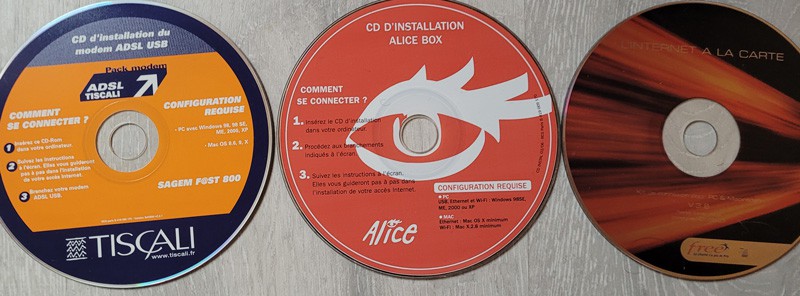
At first, I used editors provided by platforms to build websites. Building something on my PC and accessing it from school or friends’ computers was amazing at the time. Then I quickly discovered more advanced tools like Macromedia Dreamweaver, which allowed you to build HTML pages without knowing the rules of the language (but with a way to see the code, so you could still learn things quickly).
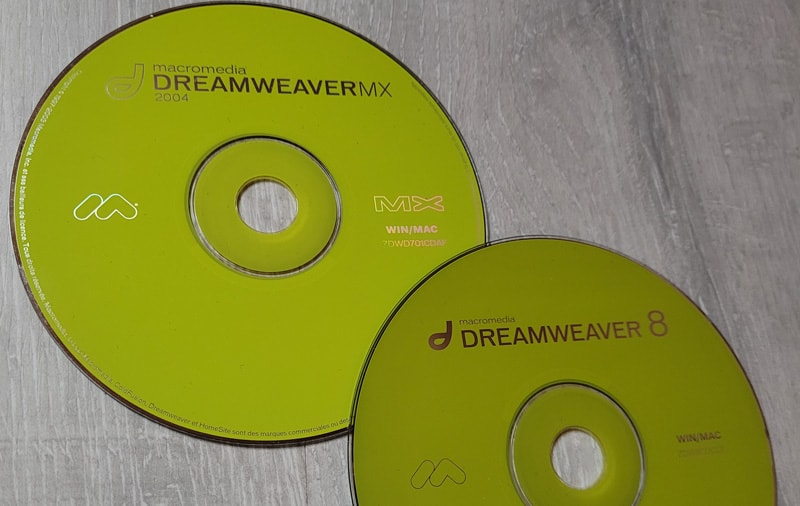
So, if you think about it, this is probably where everything in my story comes together: interest in hardware, networking, programming, and everything in between. Deciding what to study after high school wasn’t very difficult :-).

From geeks to IT pros
Teachers magic
It was the early 2000s, and without much surprise, I decided to study programming after high school (the choices were limited at the time, basically I could study programming, networking or statistics).
That’s where I learned about algorithms, the logic behind all programming languages. It felt a bit like math, to be honest, and I had a hard time seeing the connection to real use. But then we quickly applied this knowledge to different languages (ADA was the first, then C and Java).
I only did 2 years of college (a “DUT” in France), but I worked for a company’s IT department during the summer, and that’s where everything clicked for me. It helped me connect what I learned at school with what I would use in my future job. My motivation for the second year was multiplied after that, even for subjects not directly related to technology. I understood why it was important to know about communication, accounting and things like that.
Not only was I motivated to learn everything school could teach me, but I also spent more and more time outside of school exploring related topics. That’s when I started testing different Linux distributions (using live CDs that came with magazines), discovering new programming languages, and so on. At that time, the Internet was barely a thing, so magazines and books were still the main way to learn.
By the way, you can find my full resume on my personal website.
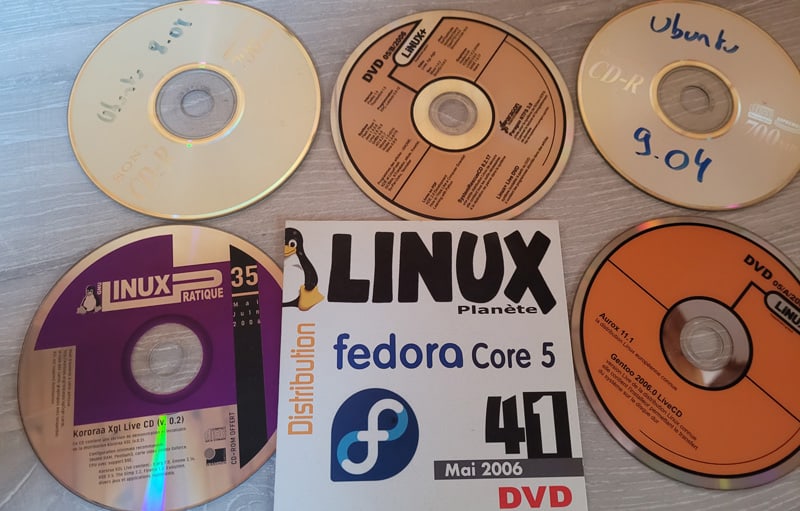
From industrial computing to selling shoes online
After graduation, I returned to work for the same company the following summer, but it was only a temporary job. I quickly found another job at a medium-sized company, half industrial, half computer design, which allowed me to use my skills and discover different technologies in various areas (tech support, networking, Linux servers, professional software, etc.).
Tech support did not take up all of my time, so I had a lot of time to learn how things worked in this company:
- For example, I spent most of my time trying to replace their outdated Access database with technologies I knew (PHP & MySQL). I was turning their production software into a website. It was a big change for them, but seeing new features and updates added almost instantly was a big improvement for the company.
- I also learned a lot about networking, Windows servers, and working under pressure (there is no exam at school with fifty employees around you asking why nothing works).
I worked there for a few years, but then the company went through a difficult period and I had to find another job in 2008. I was hired by a startup e-commerce website (selling shoes online) with a small team (about 20 people when I started). They liked my profile, with knowledge and experience in both web development and system administration. I was hired to do a little bit of everything, including technical support for the team.
The sysadmin part wasn’t that hard, there wasn’t much. Think of a big home network with an old server and network switch to connect everyone to the Internet and centralize the source code for the developers.
But these developers were at a much more advanced level than I was. I had to quickly up my game. I was no longer tinkering with my own code; it was an entire team of engineers writing PHP code as a core activity for the company. It was intense, but I got it and became part of the team.
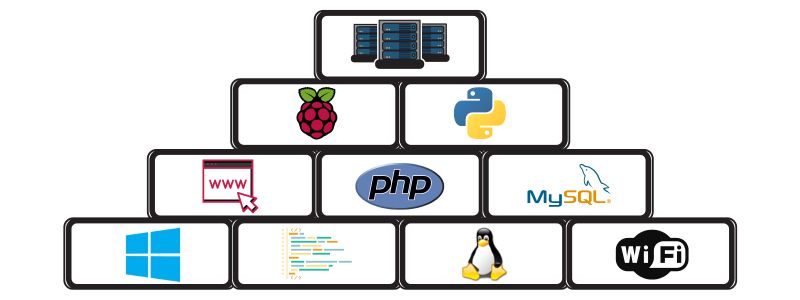
The company quickly grew, and I learned a lot about web development, networking and server administration. We went from 20 to 200 employees in a few years. I was responsible for ensuring the network could handle it and stay connected to the Internet (an e-commerce startup disconnected from the Internet doesn’t work that well ^^). I had to scale the architecture, and think about redundancy, security, and new technologies we could use to make everything work as well as possible.
After 10+ years in that company, I naturally became the Systems & Network Manager, leading a small team of technicians and spending 100% of my time on that (no more web development except for our own tools). It wasn’t easy, but it was a great experience, I love learning new things, especially when you can apply them directly and see the results quickly.
Hello World
RaspberryTips is born
Looking back, it’s clear that every part of my journey led me to start RaspberryTips. When you put all the elements of this story together – a passion for computers, web development, networking, and programming – it seems almost inevitable.
Surprisingly, I wasn’t necessarily on the Raspberry Pi bandwagon early on. I didn’t get my first one until the Raspberry Pi 3B+ was released. I knew about it before, but I wasn’t necessarily excited about it, or interested in using it for personal projects (I was using dedicated servers in data centers at the time).
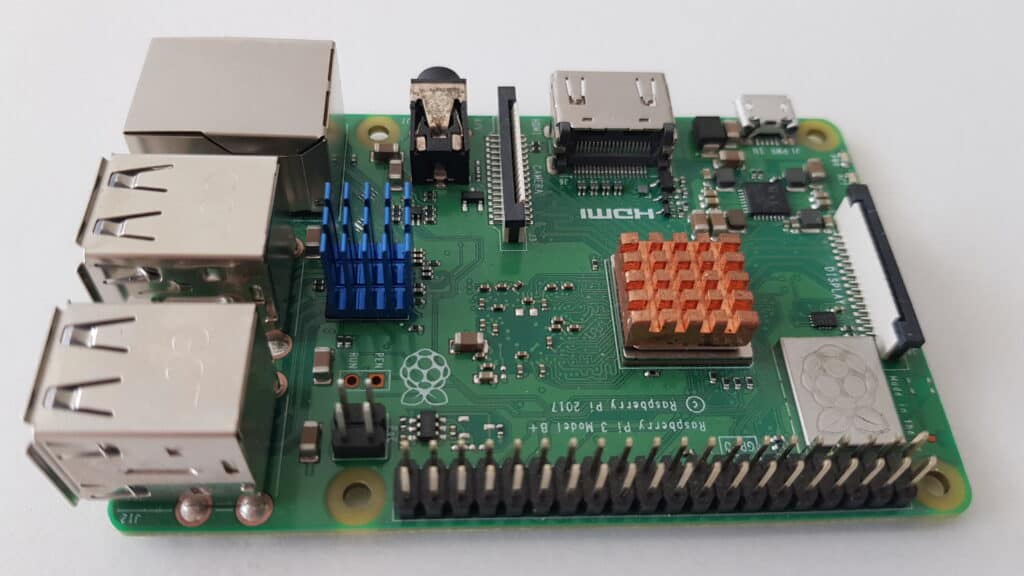
Then I became interested in creating content online, sharing what I was learning at work, running my own websites, and hopefully earning some extra income. Focusing on Raspberry Pi, which allowed me to talk about hardware, software, and programming, was a perfect fit. RaspberryTips wasn’t my first website, but it was the first one I took seriously and followed a strategic plan to give it the best chance of success.
That’s how RaspberryTips started in the summer of 2018. I was going through a rough time at work, and it allowed me to focus on something else. I was totally into it. I published about 30 tutorials in two months. Traffic was increasing very slowly, and then I got retweeted by the Raspberry Pi Foundation, which gave me a huge boost in traffic to the site for a few days, but more importantly, in motivation.
From January 2019 to this day, I have been testing and learning things, before publishing new articles on RaspberryTips regularly. Today, there are over 500 tutorials on the site, and it helps tens of thousands of visitors every day get started, get better, and understand what the heck this tiny computer is.
Side Quests: Books, videos & co
While it seems that I have always been good with words, summarizing thoughts and explaining complex concepts in written form, writing books was never a goal. But seeing questions from visitors, it became clear that I needed to find a way to help them more.
People come to my site to learn “how to do X on a Raspberry Pi”. But it can be hard to understand my tutorial if you don’t understand all the previous steps. I needed to create a guide with a structured way to get there, no matter their current level.
While links to related articles are helpful, that only in 2020, with the idea of writing “Master Raspberry Pi in 30 days” that I felt I had found the solution. A 30-day program, with a chapter a day, in a big book that explains everything about Raspberry Pi, from the first steps to advanced projects.
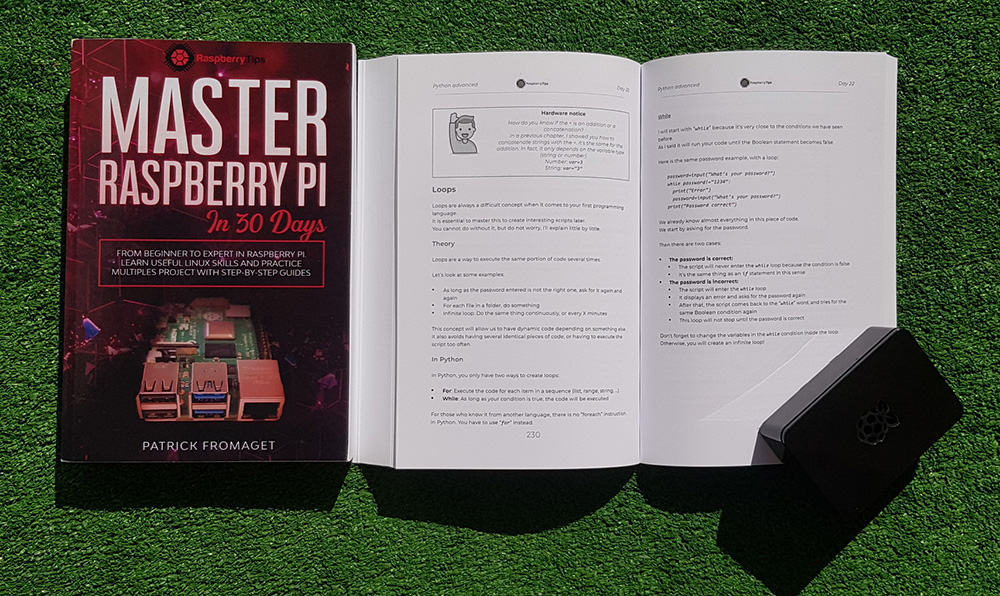
The book has been a huge success since then, certainly in terms of sales, but more importantly in terms of reader feedback, so I think it was the right move. I guess the Raspberry Pi community was missing something like this, and I’m glad it has helped so many people.
Although writing a book is a lot of work, I have used the same idea twice since then to explore related topics for Raspberry Pi owners in more depth: Python Programming and Linux Commands. You can find all my books and courses here if you are interested.
Around the same time, I also started a YouTube channel. While it was a decent success, it wasn’t the right fit for me. As you might have understood if you’ve read everything, I’m a French introvert, decent at writing but not a fan of speaking and public exposure. It’s not the right fit to become a YouTuber. I tried it for about a year, but I didn’t like playing against the algorithm. I still create videos for my private community, on my terms, without any algorithm forcing me to do certain things to get views, just trying to be as helpful as possible.
Outside of the site, I try to be active on social media, but as for YouTube, it’s not necessarily my main thing. You can still follow me if you want to be notified when I post something, here are the main links:
But the best way to follow me is to join my email list. You’ll get weekly updates on all things Raspberry Pi, Linux, and programming. Subscribe here.
You can also check my personal website for a broader view of my other projects.
What’s next?
I love doing this! I love everything I’m talking about, and most of all, I love keeping an eye on new technologies and testing things. Sharing it all here is the perfect fit for me. For now, I have no plans other than to continue working on RaspberryTips, improving the site, and continuing to add new content.
I’m well aware that the landscape may change rapidly in the coming years, especially as AI takes over the world. Our internet usage will likely change, Raspberry Pi products may be replaced by something else, and so I can’t really know what I’ll be doing in 5 years, but I’ll do my best to keep serving you. That’s one of the reasons I’m focusing more on the community these days. It allows me to stay connected to you, understand your needs, and try to meet them as best I can, no matter what the search engines or social networks want me to do.

I’m here for the long haul anyway, so I may have to adjust things like expanding the team to make things better, writing about topics I’m not necessarily good at, and not burning out :-).
By the way, please know that I read all your comments, emails, and feedback, even if I can’t respond to everyone. Feel free to contact me if you have any suggestions or words for me (use the contact page). And to stay in touch or for technical questions, the community is the place to be, with direct access to me and a lot of experienced members.
